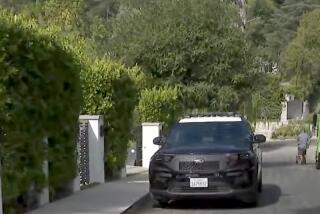Candidate Urges Valley Secession From L.A. : Politics: Police Sgt. Dennis Zine says the area’s tax dollars are being spent elsewhere. City Council Incumbent Joy Picus says she doubts that the public would support such a move.
- Share via
Police Sgt. Dennis Zine, a candidate for the Los Angeles City Council seat now held by Joy Picus, said Tuesday that if elected he would take action to help the San Fernando Valley secede from the rest of the city and become a municipality on its own.
“The Valley is not getting its fair share of its tax dollars,” the 45-year-old Los Angeles police officer, one of five candidates for the seat representing the southwestern part of the Valley, said in an interview. “We’re providing welfare to the rest of the city.”
Nor will the Valley ever get its fair share as long as the civic agenda is dominated by representatives from the more populous central city, Eastside and Westside areas, Zine contended.
“The status quo doesn’t work for us,” said Zine, promising that if elected, he will try to place a measure on the ballot to pull the Valley out of Los Angeles.
Zine also extolled his proposal before a group of about 50 residents of the Encino Park neighborhood Tuesday night, pacing in front of the dais in a gray wool suit, throwing out remarks just two feet from his audience.
“What I am calling for is the San Fernando Valley to be its own city,” he said. “We take the San Fernando Valley and we put the money right where it benefits us.”
“We’re paying for steak and we are getting hamburger,” he said.
Only four of the 15 City Council districts are located wholly in the Valley, although the Valley has more than a third of the city’s population, Zine said. Three other districts lie partly in the Valley, but their dominant portions are outside the area, he said.
About 1.2 million of the city’s 3.5 million residents live north of Mulholland Drive, according to figures from the 1990 census.
Picus, running for a fifth term, suggested that Zine’s proposal is a political gimmick to draw attention to himself in a crowded race. “This idea surfaces periodically every 15 years or so, but I have not heard any groundswell of interest in it lately,” Picus said. “He’s trying to distinguish himself from the others in the race with this.”
Picus has never supported secession. “It’s too complicated,” she said.
Top city officials said it was their understanding that secession, which was widely discussed two decades ago, would require a favorable vote not only in the Valley but in the rest of the city as well. “It’s highly unlikely,” said a top official, who asked not to be identified.
But Zine’s proposal comes at a time when Valley lawmakers and opinion-leaders, including mayoral candidate Joel Wachs and state Sen. David A. Roberti (D-Canoga Park), are promoting plans to break up the Los Angeles Unified School District, and form several new districts in the Valley.
A recent Los Angeles Times poll found that 59% of Valley residents surveyed supported dissolution of the district. Citywide, 48% of The Times’ survey respondents backed the idea, 37% were opposed and 15% had no opinion.
Zine, former spokesman for Deputy Police Chief Mark A. Kroeker, told the Encino neighborhood group that the secession idea will be supported by the same people who are in favor of creating a separate San Fernando Valley school district.
His words drew applause and murmurs from the group. “He’s very good,” said one woman.
Rival council candidate Robert Gross, a businessman who sparred with Zine throughout the evening, said the secession idea was intriguing but questioned its feasibility and effectiveness. “Over the years, I’ve heard of secession for the San Fernando Valley,” he said, “but that won’t solve the problems. We can’t keep going on a witch hunt for who’s causing the problems.”
The police sergeant also insisted that his plan is not a racially motivated attempt to cut loose from the heavily minority southern and eastern parts of the city. “It’s all about economics and getting our fair share,” he said.
For example, only 1,500 Los Angeles officers--20% of the force of 7,500--are deployed in the Valley, which has more than a third of the city’s population, he said.
Zine also estimated that 50% of the city’s tax revenues come from the Valley. Asked for the source of the estimate, he replied: “We’re looking into that.” City Administrative Officer Keith Comrie said he could not determine what portion of the city’s tax revenues come from the Valley.
More to Read
Sign up for Essential California
The most important California stories and recommendations in your inbox every morning.
You may occasionally receive promotional content from the Los Angeles Times.













